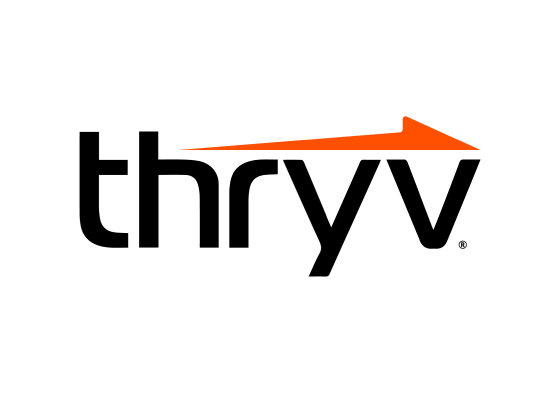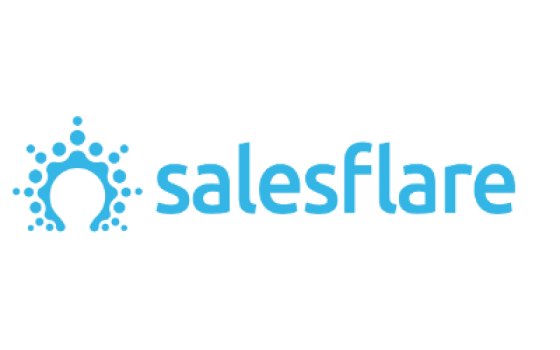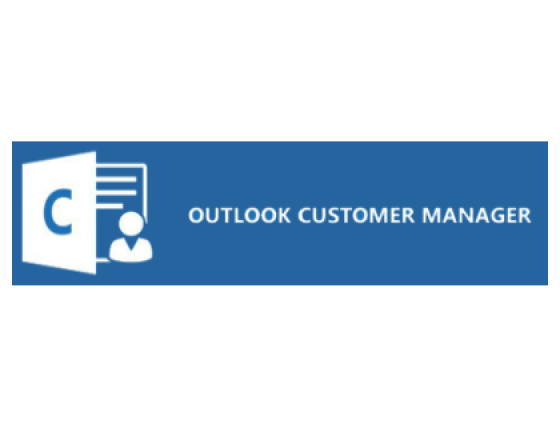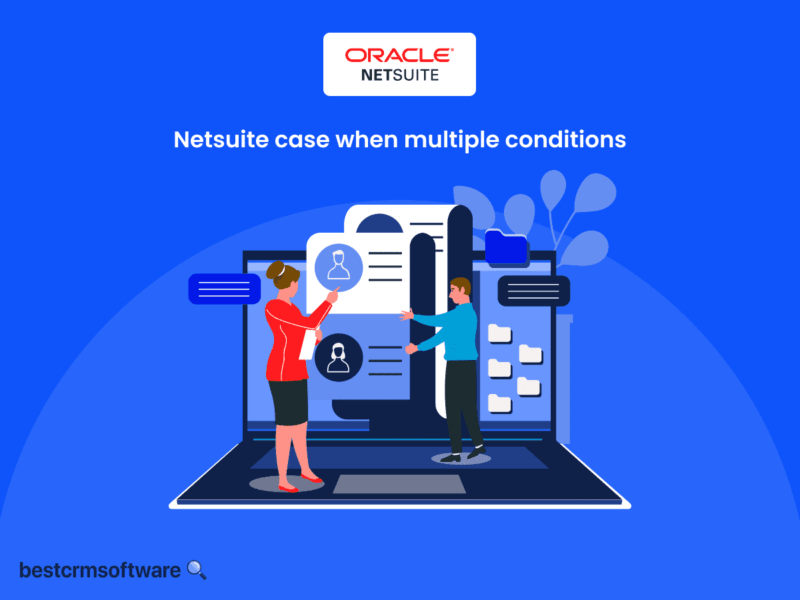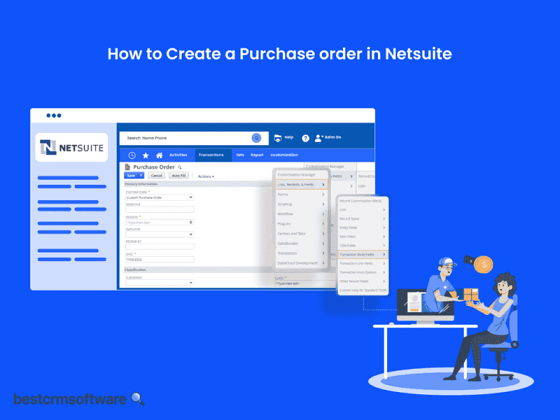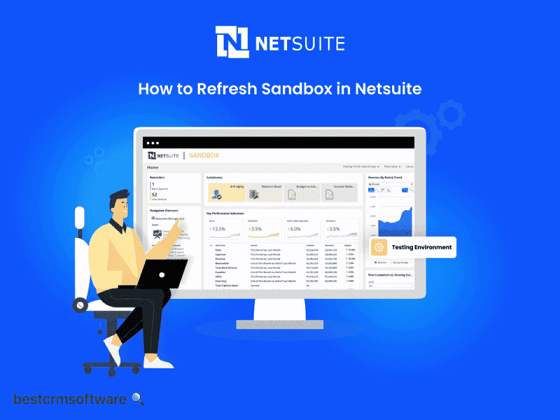
My Personal NetSuite CRM Review 2025 | Key Benefits
My Verdict
- A single data source of all customers in one platform.
- NetSuite offers training and certifications.
- Improved sales performance with visibility into pipeline and forecasts.
- Can be integrated with hundreds of e-commerce tools.
- Effective campaign management.
- Increased customer satisfaction
- It’s quite costly
- As an end-to-end tool, NetSuite is quite complex
- Limited Customization in some areas
- Support and response time is too long
An Introduction to Netsuite
Customer relationship management (or CRM) is one of the most important parts of any business. This arm of the marketing team works to keep customers happy and coming back to spend more. A lot of the time, when most people think of marketing, they’re likely thinking of acquisition, or just getting new customers.
But once you’ve got that customer to buy their first products from your business, you want them to come back again when they need more. That’s where CRM comes in. A good CRM tool knows how to keep your business top-of-mind for the customer, and how to create a relationship with them.
With Oracle NetSuite CRM, you have a whole lot of tools to help you get started. It’s a very powerful tool, and so, should be used by someone with CRM experience. This means it’s not the best for someone inexperienced in customer retention marketing.
But Netsuite does more than just CRM. From enterprise resource planning and inventory management to supply chain management and financial management, this powerful tool can help in almost all aspects of your business. Below, I’ll give you my experience with NetSuite and also advise on whether you should consider using it.
Understanding NetSuite CRM
To start, let’s get a background about this business solutions provider. For now, we’ll focus on the CRM side of things since NetSuite is involved in various types of software projects. NetSuite Inc developed Oracle NetSuite CRM – a cloud-based customer relationship management (CRM) platform. Since its establishment in 1998, NetSuite has grown to become one of the world’s leading business software providers.
NetSuite’s integrated ecosystem provides a real-time, 360-degree view of your business’s customers. This software gives you access to traditional CRM capabilities like SFA (sales force automation), customer service, as well as marketing automation. Basically, this tool can cover all CRM need for the entire business.
NetSuite Inc. originally focused on developing accounting software systems under the name NetLedger. It aimed at providing businesses with affordable, cloud accounting solutions.
However, over the years, it evolved to provide a more comprehensive suite of business management solutions and not just accounting software. This led to the company changing its name to NetSuite Inc. in 2002.
NetSuite further broadened its product range by launching NetSuite CRM in 2002. This integrated CRM solution included SFA, customer service, and marketing automation, among other features.
In 2016, Oracle Corporation acquired NetSuite for $9.3 billion. This move enabled Oracle to expand its cloud-based service offerings in the area of enterprise resource planning (ERP) and CRM for small and medium-sized businesses. NetSuite CRM has continued to be a key player in the CRM market. They provide integrated solutions to businesses of all sizes across various industries.
An overview of NetSuite CRM Tools
It’s difficult to know where to start here because the Oracle NetSuite customer relationship management tool can do a lot for you. But, a summary of the tools includes:
- Sales force automation
- Customer service management
- Partner relationship management
- Reporting and Analytics
All of the above is meant to help you foster the relationship with the customer from the moment they first come across your business. In addition, Oracle NetSuite ERP empowers you with the right tools to make sure your strategy is working through the reporting and analytics tools.
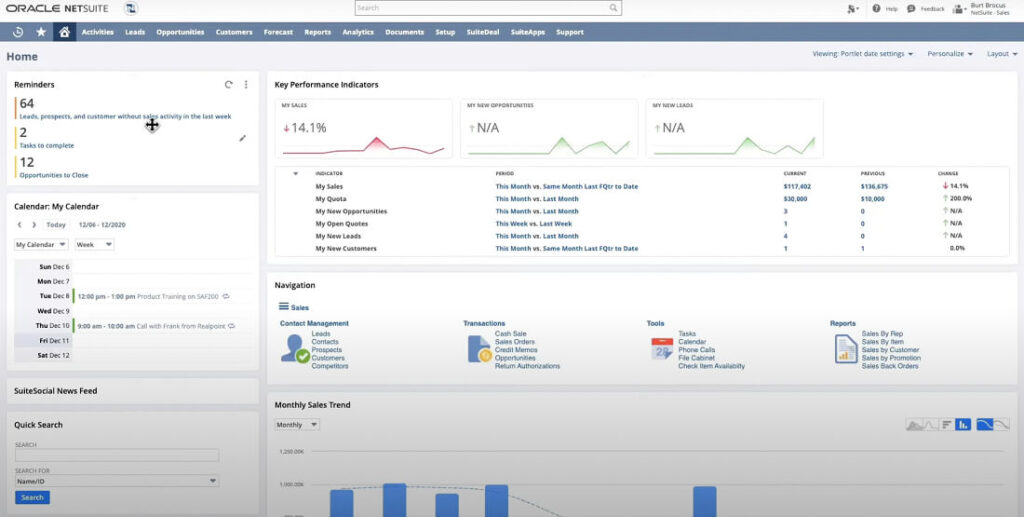
As a professional services automation tool, expect to see a single view of your prospects and customers. Also, it gives your partners and vendors as well as sales data analysts, and marketing and support teams the real-time data they need to deliver the best customer experiences. Everyone stays informed on what’s happening and when.
All of this will lead towards better sales efforts. But, the most interesting benefit of this software is how it brings together various business processes. It streamlines everything from project management planning to monitoring customer satisfaction. That’s because this ERP software understands every step of the customer journey.
NetSuite CRM for Sales
Now, we get to my favorite part about this Oracle NetSuite review. As a CRM manager for over 10 years, I’ve had the privilege of seeing how various sales tools have evolved over the years. Finding a powerful ERP Solution that considers various business processes can be a challenge.
But, when I stumbled upon Oracle NetSuite through a LinkedIn post, I knew it might be the perfect solution. Netsuite software promises to take care of all business needs through the use of integration tools such as:
- Financial planning
- Inbound and outbound logistics
- Performance management
- Fixed asset management
- Tax management
- Warehouse management
- Inventory management
… and a lot more.
When it comes to sales, basically the whole business plays a part. Oracle NetSuite understands this, and that’s why they offer this end-to-end enterprise resource planning ERP software solution.
But, when it comes to going from prospecting to deployment of goods, Oracle NetSuite will automate processes to keep workflows on track.
Below, I highlight my favorite features you should take note of:
NetSuite CRM Tools and Features
- Sales Force Automation (SFA): NetSuite CRM provides a suite of powerful Sales Force Automation applications. This software supports everything from lead management to sales forecasting. NetSuite streamlines and automates core business processes alongside the entire sales process. Your team has the time to focus on what matters, which is dealing with customers, and not so much on manual tasks.
- Customer Management: Oracle NetSuite platform offers an all-around customer view. It allows your sales teams to have access to all the relevant customer information. This includes interaction and purchase history, the customer’s preferences, and interactions with the support teams. In addition, you can make use of accounting functions such as accounts payable, which can help to create more personalized and effective sales interactions.

- Sales Forecasting and Reporting: NetSuite implementation provides powerful sales forecasting applications. These help to provide real-time visibility into the entire sales pipeline including resource management and even warehouse operations. You’ll also see a range of analytics and sales reports that provide insights into trends, sales performance, and more.

- Opportunity Management: The platform allows sales teams to track and manage opportunities from start to finish. That’s because Netsuite provides a complete view of the customer lifecycle. Expect to have the ability to track all touchpoints related to a given opportunity such as emails and phone calls. So, if a customer has a query, the customer service representative will know what’s going on at all times and help accordingly.
User Experience
The NetSuite ERP software system has been developed over many years and all kinds of “what if scenarios” have been considered. This means that it generally works seamlessly across various business functions – at least that’s been my experience so far with the cloud ERP.
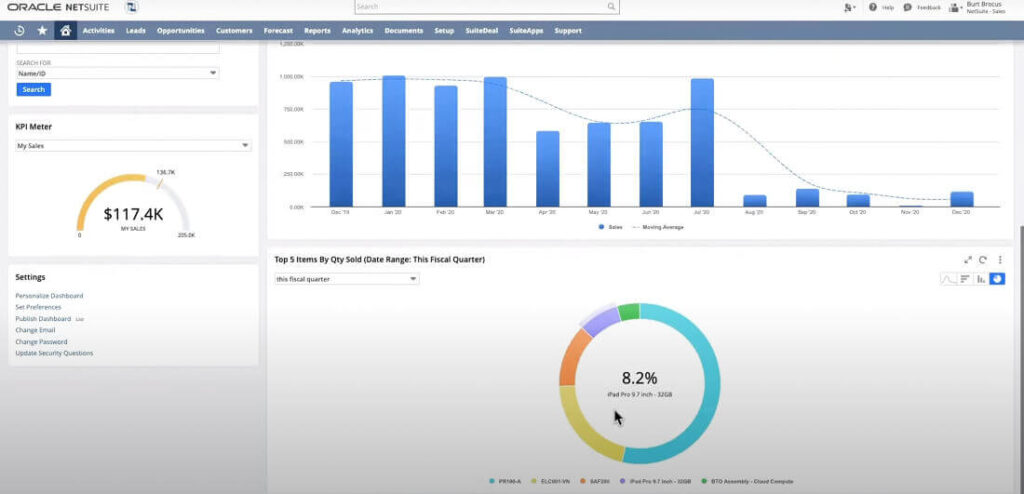
As with all other ERP systems, you need a good strategist to ensure that all points of interest are taken care of properly. But, it’s also very helpful to contact NetSuite consultants for guidance. They know all the various functionalities and integrations for financial performance, sustainable risk management and more.
But, don’t just take my word for it. Here are some testimonials from global businesses who chose Oracle NetSuite ERP implementation for their businesses:
- Nidal Othman – Managing Director, StarLink: “In the past, we counted on the finance team to share quarterly reports, but now we’ve got daily, accurate information whenever and how we need it. We’re much better organised internally and more efficient—something a growing tech company should be.”
- Paul van Diepen – COO, Secrid: “We chose NetSuite for its flexibility, agility, and for the possibilities it offers us as we grow.”
- Candles and Supplies: “NetSuite has been revolutionary for us. Having everything under one roof has greatly improved our efficiency, and I no longer have to manage a network.”
- Capitol Coffee Systems: “I’ve never encountered a software package that worked as well as NetSuite. I can’t imagine why anyone would spend money on infrastructure—it’s just silly.”
- Hestra USA: “NetSuite is the core backbone of our company and has supported our dramatic growth since we first went live.”
Highest Rated Features
- NetSuite OneWorld: This real-time, global management platform manages multiple software tools for international businesses. It includes the multicurrency management system to help with managing financials even in multiple currencies. This is a great feature to have when you deal with customers around the world. Between exchange rates and the complexities of local costs of doing business, NetSuite OneWorld is a great feature.
- Quote and Order Management: As one of the best accounting software providers around NetSuite CRM gives sales teams a lot of flexibility. They can generate quotes and implement order management efficiently. The platform seamlessly converts quotes to sales orders as you go along the customer journey. When the deal is closed, NetSuite then turns the completed orders into invoices.
- Sales Performance Management: This feature will help your business manage and standardize sales compensation for the team. It’s integrated into the business’s financial processes system, and so, can handle commission calculations. The ERP system can also communicate compensation plans and changes to deals such as returns. It’s a great way to have transparency into commission earnings.
Lowest Rated Features
- Reporting & Dashboards: This feature provides real-time reporting, KPIs and a dashboard to get an overview of what’s going on numbers-wise. All of these work together to give decision-makers an understanding of what’s happening in the business. However, it’s not suitable for those working on the day-to-day of the sales process. You’ll need to look deeper in your vertical to get a better idea of BI analytics that can influence strategies.
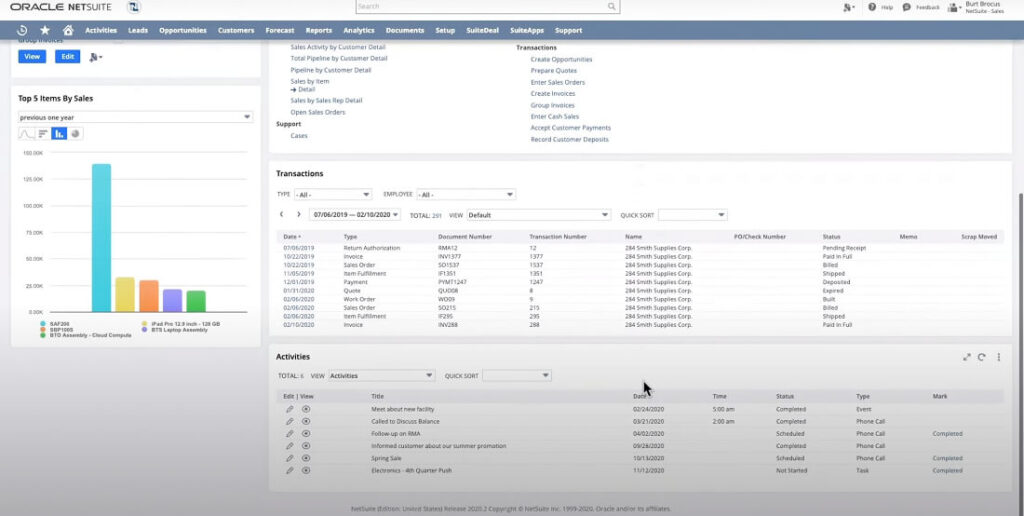
- Data Warehouse: Consolidate NetSuite and non-NetSuite data in order to gain even deeper insight into your financial data, supply chain information, warehouse management details and so on. Through the Data Warehouse, you identify problems, potential trends and opportunities. However, it can get overwhelming to see all the information at once. Also, you’ll need assistance from a NetSuite account manager if you want to integrate other tools.
Integration and Compatibility
An important part of using this ERP platform is that you can integrate NetSuite with other tools.
Oracle NetSuite provides powerful integration capabilities. It connects with various third-party applications and platforms. These can be as complex as human resources software, or as simple as general ledger software.
Netsuite users can streamline their operations, automate processes, and eliminate manual data entry. Some key integration options available for NetSuite include:
- REST-based Application Programming Interface (API): It enables developers to integrate external systems with NetSuite. This API allows for the exchange of data and transactions, enabling seamless communication between NetSuite and other applications.
- SuiteCloud Platform: Get tools and resources for building custom integrations and extensions for your business. This covers development environments, such as SuiteBuilder and SuiteScript, to customize NetSuite for specific business needs.
- SuiteTalk: This SOAP-based API allows online stores to integrate NetSuite with external systems, such as e-commerce platforms, and other custom applications.
It’s clear from the above that the NetSuite compliance process is quite flexible. There’s the potential to integrate with many compatible tools. However, below, I’ll highlight the ones I consider the most valuable.
Compatibility with Other Software and Platforms
Oracle NetSuite is compatible with a wide range of software and platforms, facilitating integration with different business functions and processes. Here are some areas where NetSuite demonstrates compatibility:
- E-commerce Platforms: NetSuite integrates seamlessly with popular e-commerce platforms such as Magento, Shopify, WooCommerce, and BigCommerce. This ERP solution integration enables businesses to synchronize customer data, inventory management, and financial data information between their e-commerce storefront and NetSuite.
- Customer Relationship Management (CRM) Systems: While NetSuite offers its own CRM functionality, it also integrates with external CRM systems. So, if you already use Salesforce, Microsoft Dynamics CRM, and HubSpot, you can simply integrate these. This allows businesses to consolidate customer data, track sales activities, and streamline interactions with customers.
- Human Resources (HR) and Payroll Systems: Your People team will love that they can also get in on the action with NetSuite. Popular HR applications such as Workday and BambooHR can be integrated with this ERP platform. Such an integration ensures seamless data flow between HR systems and NetSuite, enabling efficient management of employee data, payroll processing, and commissions payments.
- Business Intelligence (BI) and Reporting Tools: Popular BI and reporting tools like Tableau, Power BI, and Oracle Analytics Cloud are available in this ERP system. This integration enables businesses to leverage advanced analytics and reporting capabilities, gaining valuable insights from NetSuite data.
- Payment Gateways: An important part of business functions is, basically, being able to “follow the money”. NetSuite integrates with various payment gateways such as PayPal, Stripe, and Worldpay. This integration enables businesses to process the financial management of payment transactions, and streamline the buying process using well-known accounting software.
NetSuite Pricing and Value
We’ve seen from the above that there’s a lot happening with the Netsuite enterprise resource planning platform. But, for the sake of this review, we’ll focus on the pricing of the Oracle NetSuite CRM platform.
A simple Google search won’t give you the information you need, before you state your case to the higher ups to purchase NetSuite. That’s because Oracle Netsuit works on a customization basis when it comes to pricing. The NetSuite consultants will ask you to set up a meeting where you discuss your business’s needs.
Since Oracle NetSuite pricing is not set, you’ll have to have some good negotiation skills. The right decision makers will have to be on the call with the NetSuite platform consultants before you purchase NetSuite and their professional services.
But, if you first want to recommend Oracle NetSuite, I’ll give you a rough estimate of how much you could pay. First, is the monthly licensing fee of $999. But, on top of that, your business will be paying about $99 per user, per month. Remember, this is just an estimate of NetSuite pricing to help you get started in terms of budgeting.
Alternatives
- SAP Business One: Other ERP software, such as SAP Business One, can be used both in the cloud and on your IT system. This ERP platform works very similarly to Oracle NetSuite and is one of it’s biggest competitors. SAP, however, offers industry-specific support. The ability to provide niche solutions makes it an attractive alternative.
- Microsoft Dynamics 365: Microsoft Dynamics 365 is a suite of integrated business applications that includes ERP, CRM, and other productivity tools. This is similar to Oracle NetSuite’s ERP platform solutions. The integration with other Microsoft products, and advanced analytics capabilities has seen many businesses choose it over NetSuite.
- Sage Intacct: Those requiring a tool that complies with international accounting standards choose Sage Intacct. This cloud-based ERP solution provides more than just accounting functions. It covers various financial management needs such as order management, general ledger, accounts payable and receivable, cash management, and more. Many choose Sage Intacct because of its ease of use.
- Acumatica: Acumatica is a cloud-based ERP solution known for its flexibility and scalability. It offers integrations for financial management, distribution, manufacturing, and customer management. It’s quite a close competitor to NetSuite as it provides a user-friendly interface, customizable dashboards, and integration capabilities with other business applications.
Security and Compliance
ERP systems could be considered some of the most vulnerable to data breaches. That’s because, with the various possible integration tools, there may be some weaknesses that hackers can take advantage of. The last thing you want is to end up in a business news article highlighting a major data breach because of your financial management software.
That’s why Oracle NetSuite implementation takes security very seriously. Other than the need to protect customer data, it’s also a legal requirement to be able to prove this. Based on my experiences with Oracle NetSuite, these are the most important security and compliance features.
Security Features
- Role-based Access Control (RBAC): As mentioned earlier, you pay for NetSuite CRM based on the number of people using it. By controlling user access to different data and functions within the system, there’s less likelihood of sensitive data ending up in the wrong hands. Administrators can define roles and permissions, allowing them to grant or restrict access to specific accounts, records, or actions based on user roles and responsibilities.
- Two-Factor Authentication (2FA): Before you can log in to NetSuite CRM or use any of the NetSuite implementation tools, you need to activate two-factor authentication. This adds an extra layer of security to user logins.
- Data Encryption: Employing encryption to secure data transmission and storage is common practice for any system that works through an internet connection. Data in transit is encrypted using industry-standard protocols, such as SSL/TLS, to protect against interception and unauthorized access.
- Audit Trail and Activity Monitoring: All user activities are recorded, including changes made to records, login attempts, and system events. This feature enables administrators to monitor user actions, detect unauthorized access, and investigate any potential security breaches.
- Secure File Attachments: NetSuite CRM allows users to securely attach files and documents to records. These file attachments can be secured and password-protected. It ensures that only authorized users with appropriate permissions can access and download the files. This feature helps protect sensitive data and confidential information.
- Security Compliance: NetSuite CRM adheres to various security standards and compliance frameworks, such as ISO 27001 and SOC 1 and 2. These certifications validate that NetSuite has implemented robust security controls and follows best practices in data protection and privacy.
Pros and Cons
Pros of NetSuite CRM
- Enjoy a single data source of all customers in one platform. Monitor each customer from the moment they’re a sales lead, right until the post-purchase phase of their customer journey. You’ll get visibility of both online and in-store purchases and queries.
- Improved sales performance with visibility into pipeline and forecasts. This helps businesses to streamline the sales process with a unified quote-to-order fulfilment solution.
- Effective campaign management helps marketers execute their marketing campaigns across multiple channels. These include social media, email, browser ads and so on.

- Increased customer satisfaction is an important part of any business’s success. With NetSuite, support teams have access to customer information at any time. So, when a customer asks about an order, the customer support team knows where to check for details.
Cons of NetSuite CRM
- It’s quite costly, especially for smaller businesses with limited budgets. It requires a monthly licensing fee before other costs such as user access, implementation costs, and customization expenses are added.
- As an end-to-end tool, NetSuite is quite complex. I mentioned earlier that you need to have some experience with CRM-related tools before choosing NetSuite CRM software. Implementation may require specialized expertise, and users may need training to fully utilize the system’s capabilities.
- Limited Customization in some areas. While NetSuite offers robust customization options, there may be certain limitations in specific areas. Some customization requirements may require advanced development or consulting services, adding to the overall cost.
- Support and response time is a little too long, in my opinion. Especially when you consider the amount of money we’re spending on the NetSuite range of products. Just so you know, the level of support and response time from NetSuite can vary from a few hours to a few days based on the subscription tier and the complexity of the issue.
Suitability Assessment
Choose NetSuite CRM if you:
- Need an end-to-end financial management tool that also includes robust accounting software.
- Require a centralized data source for your whole business – from customer leads to financial management to employee performance.
- Need a tool to help you prospect potential customers better, and so develop marketing and customer service strategies better.
- Desire to align sales and marketing efforts across the business.
- Need a tool to help you manage sales-related KPIs, commissions and referral bonuses in one platform.
Avoid NetSuite CRM if you:
- Have no CRM experience
- Are a small business with a small budget and small customer base
- Need a ready-made package you can simply adopt for your business
FAQs
-
1) How much does NetSuite CRM cost?Expect to pay about $999 monthly licensing fee. However, you’ll also have to pay a monthly fee per user. This amount depends on the package NetSuite puts together for you based on your needs.
-
2) What makes NetSuite CRM different from other CRM solutions?Unlike traditional CRM solutions, NetSuite CRM provides a holistic, 360-degree view of your customers by integrating with other NetSuite solutions. It not only manages front-office operations but also ties in back-office processes, including order management, upselling, renewals, and commission payments.
-
3) Is NetSuite CRM suitable for small businesses?Yes, if you have the budget. NetSuite CRM is scalable and can grow with your business. However, the cost and complexity of the system may be a consideration for very small businesses.
Netsuite Resources: Our Essential Guides and Tutorials
How To Become an Administrator in NetSuite
Learn how to become a NetSuite certified administrator to help the organization get maximum benefit from their investment.
How To Become an Administrator in NetSuite
How To Create A Saved Search In NetSuite
With our step-by-step guide, you will be able to learn the basics of NetSuite Saved Search to get the data you require to run your business.
How To Create A Saved Search In NetSuite
How To: Netsuite Case When Formula with Multiple Conditions
Saved searches in Netsuite just got easier! Learn how to create a Netsuite Saved Search to combine two Case When statements in criteria.
How To: Netsuite Case When Formula with Multiple Conditions
How to Change a Password in NetSuite
Learn how to change your password in NetSuite with our step-by-step guide. Safeguard your account and ensure security by updating your password.
How to Change a Password in NetSuite
How to Create a Purchase Order in NetSuite
Want to know how to create a purchase order in NetSuite? read this guide for step-by-step instructions, along with useful tips and tricks.
How to Create a Purchase Order in NetSuite
How to Refresh Sandbox in Netsuite
Keep your NetSuite testing environment updated with a sandbox refresh. Learn what it is, why it’s important, and how to do it in easy steps.
How to Refresh Sandbox in Netsuite
How to get the NetSuite SOC 1 Report
Discover what the NetSuite SOC 1 report is and how to get it using different methods. Also, understand the importance of the SOC report.
How to get the NetSuite SOC 1 Report











